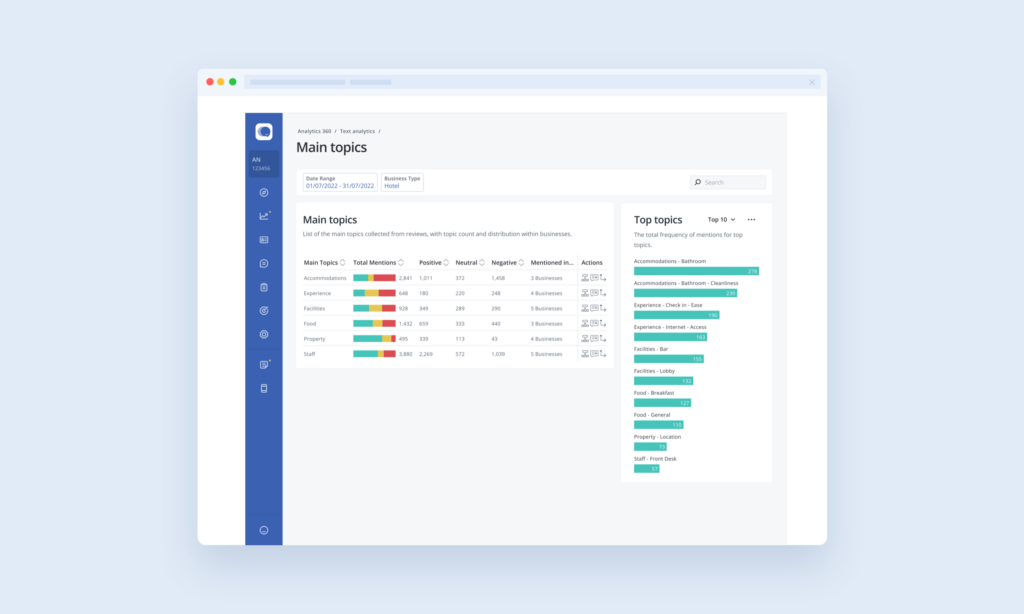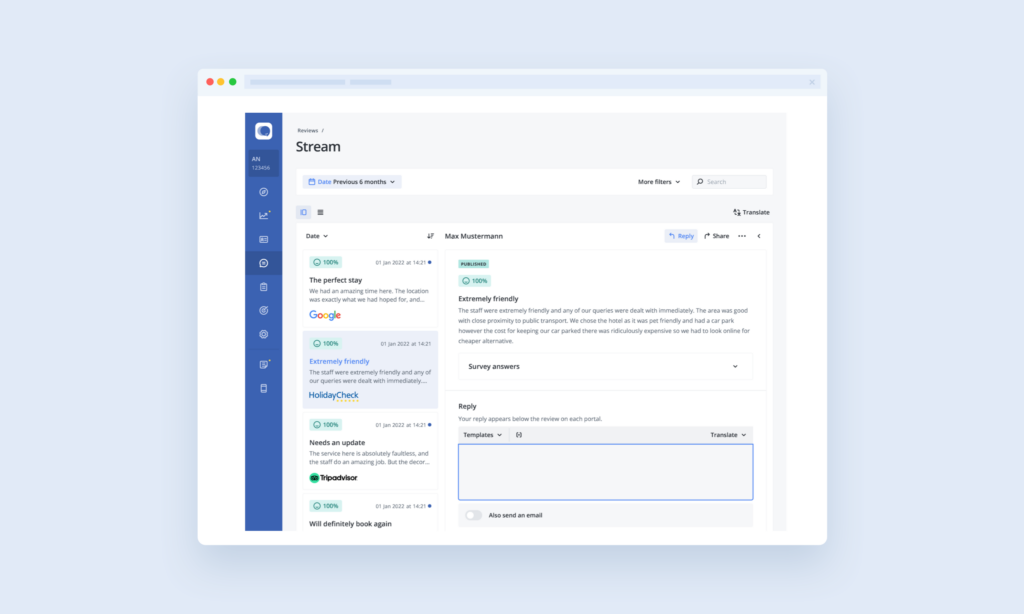In the competitive hospitality world, simply measuring guest satisfaction is no longer enough to stay ahead of the game. To truly elevate your hotel business, you need to allow your guests to share their thoughts and opinions on their experience with you.
It’s time to embrace the power of listening and engage with your guests in a meaningful way. That’s why we’ve compiled a list of the top five survey questions used by the world’s best hoteliers.
These questions have been carefully crafted to allow your guests to freely share their feedback and get specific insights into high-impact areas of your business. Start using them, and you’ll gain a wealth of valuable information to improve and enhance your guest experience.
So, let’s discover how you can take your hotel to new heights by listening to your guests with these five actionable survey questions.
1. “What aspect of your stay could have been better, and how can we improve it?”
As with all the questions on the list, this is open-ended so guests can give specific feedback. Unlike closed-ended questions that limit guests to pre-determined responses, this question encourages guests to share their thoughts, opinions, and suggestions in their own words.
The rationale behind this question is that it helps you identify areas of improvement that you may have overlooked or not addressed in other survey questions. It also allows guests to highlight issues unique to their stay and provide insights into what aspects of their experience were lacking.

You’ll find the answers to this question extremely useful, because they give specific ways you can improve the guest experience. By analysing the feedback and identifying common themes, you can develop targeted strategies to address the issues and make tangible improvements.
For example, if guests consistently mention that the check-in process was slow, you can focus on streamlining the check-in process or providing additional training to reduce wait times.
2. “Did you encounter any issues with our amenities (e.g., Wi-Fi, gym, pool, etc.)? If so, please explain.”
Guests often have different expectations and experiences with hotel amenities, so this question is designed to get a better understanding of what your guests want.
There are some guests who travel regularly and, thanks to their experience, have extremely high standards. However, others might be more accustomed to simple accommodation without gyms, pools or spas.
By asking guests to share any issues they faced, hotel managers can gain valuable insights into their guest demographic, how guests are using and experiencing the amenities, and identify patterns or recurring issues.
You should pay attention to the answers to this question. This is because it provides specific feedback to help you prioritise repairs, maintenance, and upgrades for the amenities that matter most to your guests.
For example, if you get a lot of responses about Wi-Fi issues, you can prioritise upgrades to the hotel’s internet infrastructure to improve its reliability and speed.
By prioritising your guests’ needs, you can ensure that your hotel stands out from the competition while providing a comfortable and enjoyable stay for all your guests.
3. “How could our staff better meet your needs during your stay?”
The question is perfect for assessing staff performance and getting customers to share ideas for better service.
Gathering this type of feedback will help you spot your employees’ strengths and weaknesses. The result? You can make meaningful changes that benefit both your team and your guests.
With your responses, you can deliver customised training or mentoring programs. This helps your staff more effectively address guests’ needs and expectations, leading to improved service quality and guest satisfaction.
For example, if guests frequently mention that they have trouble communicating with staff due to language barriers, you could provide language training to your employees to improve their communication skills.
Ultimately, question three can help you improve your staff’s performance and ensure that they provide the best possible service to your guests. By listening to your guests and acting on their feedback, you can create a hotel experience that exceeds their expectations. This will leave them wanting to come back again and again.

4. “Which aspect of our breakfast/dining experience could be improved, and how would you suggest we do so?”
As you know, food and beverage offerings can make or break a guest’s overall experience at your hotel.
This question allows guests to share specific feedback about their dining experience, from menu variety to service quality. By asking for their suggestions, you can learn about the strengths and weaknesses of your dining experience. You can also get insights into things your guests would like that you may not have considered.
This feedback from this question is invaluable, as it allows you to make data-driven changes to your menu, presentation, or customer service. For example, if guests frequently mention they would like more vegetarian options, you can add new vegetarian dishes to the menu. Or, if guests complain about slow service, you can address the issue by providing additional training to the restaurant staff.
Don’t be hesitant to ask your guests for their feedback on how you can improve the dining experience at your hotel. By doing so, you not only show them that their opinions matter – it will also lead to increased satisfaction and loyalty among customers.
Use this knowledge to make targeted upgrades in food and beverage services; ultimately resulting in a better guest experience.
5. “If you had any issues during your stay that were resolved, how could the resolution process have been more efficient or satisfactory?”
It’s no surprise that the way your hotel deals with and resolves customer concerns can greatly affect guest loyalty. This question focuses on the resolution process and aims to identify opportunities for improvement.
By asking your guests for their thoughts on the resolution process, you can gain insights into how effective your current process is, and discover ways to improve it. You can use this feedback to optimise your issue resolution process, ensuring problems are addressed more efficiently and effectively.
This may involve reevaluating communication channels, staff training, or internal procedures for handling guest concerns. For example, if guests suggest that the response time was slow, hotel managers can adjust the communication channels to respond faster.
By improving the issue resolution process, you can enhance guest satisfaction, prevent negative reviews, and promote positive word-of-mouth recommendations. So, don’t forget to ask your guests for their feedback on the issue resolution process. Use their suggestions to make targeted improvements to your hotel’s customer service and you’ll soon reap the rewards.
Start improving guest satisfaction today with these 5 survey questions
When used according to best practices, surveys are a powerful tool for to gather feedback and improve guest satisfaction. By including specific and actionable questions in your surveys, you can unlock more valuable insights and prioritise your most impactful improvements.
We hope the five questions we’ve shared in this article have inspired you to rethink your survey questions. Remember, though customer satisfaction metrics are hugely important, just asking guests to rate their satisfaction on a scale of 1-5 won’t give you a complete picture.
If you found this article helpful, share it on LinkedIn to help other hoteliers unlock the power of surveys and improve their guests’ experiences. Together, we can elevate the hospitality industry and create unforgettable stays for all your guests.
